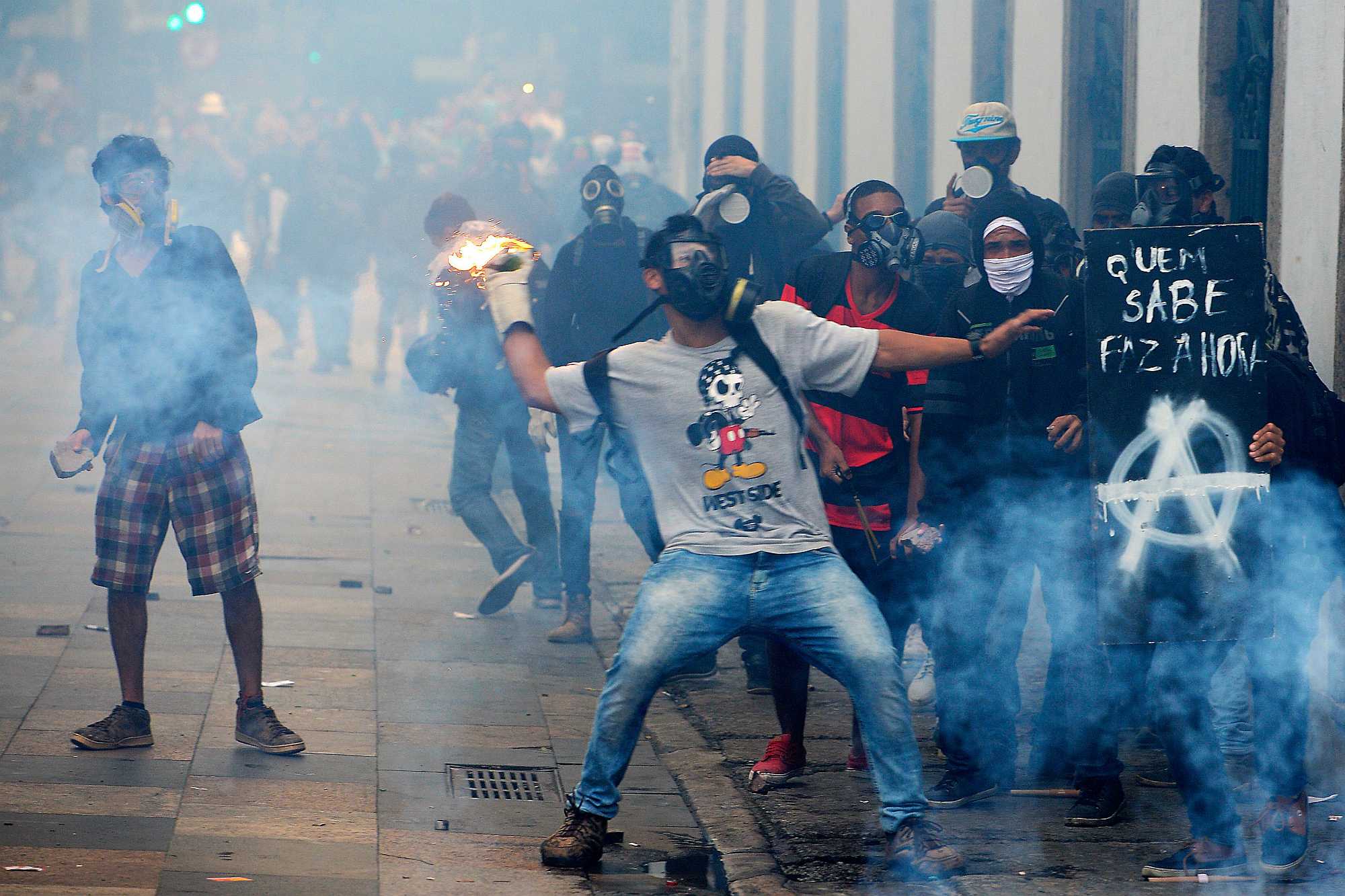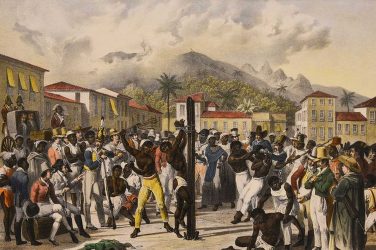Amid record levels of unemployment and a terribly unpopular government, unions and citizens from all walks of life took part on Friday in one of Brazil’s biggest ever strikes.
More than 35 million people in Brazil have been taking part in one of biggest general strikes in the country’s history against President Michel Temer’s neoliberal reforms, bringing the country to a standstill.
The strike was largely organized by the Unified Workers Central, or CUT, the largest union federation in Latin America, and the Workers Party of Brazil, former President Dilma Rousseff’s political party.
“Temer does not even want to negotiate,” said Vagner Freitas, national CUT president. Freitas estimated that the strikes would break previous records with more than 35 million people participating by leaving their work.
In Brazil’s biggest city and economic hub, São Paulo, only one subway line was operating, 70 major routes were blocked off as was access to the city’s major airport.
Before daylight, a number of protesters clashed with police while trying to occupy a vacant building. Police were also seen firing tear gas to disperse protesters and at least 12 people were detained.
Similar scenes were also seen further South in Santos, where police reportedly used tear gas in an attempt to clear roads leading to the city’s port.
In the city of Goiânia in central Brazil, police were seen violently breaking up protesters, with one man being forcefully grabbed and another shown bleeding.
David Miranda, the first LGBTQ city councilor of Rio de Janeiro, was hit by a car during Friday’s protests after setting up traffic cones to block vehicles. The car stopped in front of Miranda and suddenly accelerated, toppling him and another protester. Both demonstrators were not critically hurt.
In Rio de Janeiro, the bridge between Rio de Janeiro and the neighboring city of Niterói was jammed tight with traffic for a number of hours in the morning. Large protests also took place in Salvador, the capital of the northeastern state of Bahia, and in Curitiba in the southern state of Paraná and Belo Horizonte, the capital of Minas Gerais.
In Porto Alegre, police also launched tear gas and smoke from fires lit on the streets billowed into air. Banks, schools and transport were brought to a halt in Florianópolis, capital of Santa Catarina state, as police surrounded the crowds of protesters moving through the streets.
Other cities across Latin America’s largest country had a similar fate. People set up road blockades, burning tires in the streets, and protesting the government and its neoliberal labor reforms and austerity programs, with many holding signs of “Fora Temer!” (Temer Out!).
Authorities had boarded up state buildings in the federal capital of Brasília and local Brazilian media reported that taxis and rideshare applications offered people discounted fares to help keep cities running amid the strikes. In rural areas, locals were seen blocking off streets in protest using tractors.
Dozens of unions, grassroots organizations, teachers, church leaders, civil servants also threw their support behind the strike.
“It is going to be the biggest strike in the history of Brazil,” said Paulo Pereira da Silva, president of trade union Força Sindical.
“The idea is not making an action, but getting people to the streets and squares, stopping all production and services; transform cities into ghost towns,” said Vera Paoloni, director of communication of the Single Confederation of Workers, in the state of Pará, Vera Paoloni.
“Reforms of such importance can not be implemented without extensive discussion,” said Leonardo Steiner, the auxiliary bishop of Brasília, in an interview published by the National Conference of Brazilian Bishops.
The strike was called immediately after Temer’s administration pushed through a controversial labor reform bill on Wednesday in Brazil’s chamber of deputies.
The reform would undermine workers’ rights by eliminating payment for their commute from their contracts, reducing compensation for employer abuse, and most importantly, allowing employers to reduce workers’ salaries while increasing their work hours.
The bill, which proposes to end mandatory union dues, must still be approved by the Senate. It was approved by Brazil’s lower house by 296 votes to 177.
Temer is also proposing a 20-year freeze on public spending and cuts to pension protections.
The general strike comes amid a dismal disapproval rating for the Temer administration — a staggering 87 percent, according to the latest Ipsos poll.
The mass mobilization of workers and civil society also comes on the heels of ongoing protests, such as the five-day encampment of indigenous peoples and a police union protest, both occurring in front of Brazil’s Congress.
“I invite all of you to participate in the strike, in an orderly fashion without chaos,” Bishop Flavio Giovanele, a strike organizer, told Brazilian news site Plus 55.
“Because if we want a peaceful Brazil, we need peaceful protests. But we also must protest steadfastly our position in regards to the pension and labor reform.”
The strikes also come on the back of record unemployment figures, which topped more than 13 million people, adding to the country worst economic recession in history. Temer’s government, however, claims that it had inherited the problem and is working to change the situation
Conservative leaders around the country have condemned the strike and threatened unions and striking workers with fines and wage discounts.
Lula and Rousseff’s Encouragement
Former Brazilian presidents Dilma Rousseff and Luiz Inácio Lula da Silva praised their country’s general strike on Friday, which was the largest held in decades.
Rousseff and Lula, who both belong to the Workers’ Party, said the nationwide action was an important demonstration of resistance to President Michel Temer’s neoliberal administration.
“The general strike shows that the Brazilian people are courageous and capable of resisting the coup,” Rousseff posted on her Facebook page.
She also commented on the strike in a public statement, saying “my heart is filled with hope” and that “the struggle for better days for all Brazilians is just beginning.”
Lula, Rousseff’s predecessor, also weighed in on the historic mobilization of Brazilian workers.
During an interview with Radio Brasil Atual he described the strike as a “total success,” adding that “there’s no other way except to continue the fight, to recuperate and improve rights and the quality of life for the Brazilian people.”
Lula emphasized that the streets of São Paulo and São Bernardo do Campo, where he lives, are empty. According to Lula, this is a sign that “the people have decided to paralyze the city in protest against the stripping of our rights, against labor reform, against social security reform, unemployment and salary reduction.”
“Not even on Sundays have I seen such light traffic as I’ve seen today. It’s satisfying to know that Brazilian people are becoming conscious,” he added.
Lula also refuted promises made by Temer that Brazil’s economic situation would improve after Dilma was impeached.
“To say that things would improve was a lie,” he said. “Demolishing worker’s rights doesn’t improve anybody’s life.”
Lula joked that the general strike has even extended to his daily exercise regime.
“Today I’m on strike. I’ve put aside doing exercises. Even the Lula Institute is not functioning.”
Pension and Labor Reforms
Brazilian unions called the first nationwide strike in 21 years to protest against pension and labor reforms being pushed by the conservative government of President Michel Temer.
“We are going to have the biggest general strike in the history of Brazil,” said Vagner Freitas, the president of the Central Workers Union (CUT).
Brazilian unions called Brazil’s first nationwide strike in 21 years against a tough austerity and reform bill put forward by President Michel Temer. The bill aims to reduce labor costs and erode the power of unions. Temer said he hopes it will kickstart an economy battered by a recession. Workers’ Groups think the reforms go too far and question the government’s legitimacy.
São Paulo, Brazil’s most populous city and financial center, was the worst affected by early Friday. All public transport networks were closed, bringing the city to a standstill. Meanwhile, police resorted to firing tear gas at protestors who had blocked off a highway.
Similar scenes were reported in Rio de Janeiro, where protestors lit a fire on a major bridge, disrupting commuter traffic. Police also fired tear gas at a small group of protestors outside the main bus station. While many banks in Rio were closed, the city appeared to be less affected as cafes, restaurants and shops operating as normal.
Transport services were also completely shut down in the capital Brasília, Belo Horizonte and Curitiba.
Brazil’s National Civil Aviation Agency reported that “operations at the airports are functioning normally,” although there were multiple reports of delayed and canceled flights.
The strike comes two days after the lower house of congress passed reforms to reduce labor costs and erode the power of unions. The labor reforms must now be passed by the Senate.
Since coming to power last year, Temer has advanced a tough austerity and reform program in a bid to kickstart an economy battered by a recession.
But his term has been marred by demonstrations and ongoing corruption scandals since he took power from former leftist President Dilma Rousseff after she was removed for breaking budget rules in what her supporters dubbed a “coup.”
Rousseff’s Workers Party has its roots in labor and social movements, which have rallied against Temer.
Adding to Temer’s troubles, nearly a third of his cabinet and congressional allies are under investigation as part of a widening corruption scandal that has revealed eye-popping levels of graft at the top of government.
Government figures released Friday showed that Brazil’s unemployment rate covering the first quarter of 2017 was 13.7 percent, up from 13.2 percent in the last quarter.
Unemployment in Brazil has been rising steadily for the past two years, ever since the economy was hit by recession in early 2015. More than 14 million are currently out of work, government statistics show.
The economy shrank by 3.8 percent in 2015 and is expected to have contracted by a further 3.5 percent in 2016, marking the country’s most painful recession in more than a century.
Government and central bank chiefs project a modest return to growth this year, although that largely hinges on whether Temer will succeed in passing proposed austerity reforms.
teleSUR/DW






